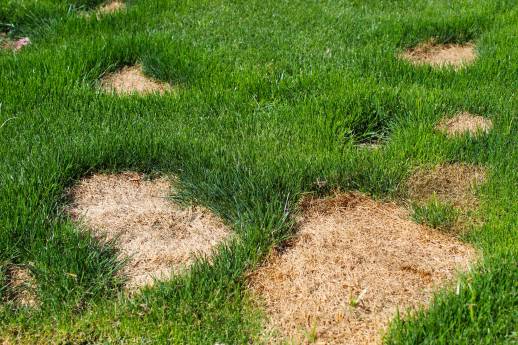Connect with a verified veterinarian in minutes. Licensed vets are available 24/7 to answer your questions. No need to worry about your furry family member.
Does your lawn have spots of dead grass? Do you have a female dog? If so, you may have been told your female dog is ruining the grass. But is that really true?
Has your female dog ruined the grass? Are you worried she could have a health issue? If so, you’ve come to the right place. We understand this can be a concerning issue for pet parents.
We’ve put together some information about whether female dogs ruin grass and what you can do about this issue. Let’s get started!
Why do Female Dogs Ruin Lawns?
Is it only a myth that female dogs ruin grass? You may have heard this from a lawn company or a landscaper. They may have even provided a name for this scourge –“Female Dog Spot Disease.”
Do female dogs really ruin the grass? Well, possibly. The reason is that female dogs squat rather than lift their legs to pee. When a female dog squats to urinate, the liquid pools in one area. However, when a male dog lifts his leg to pee, the urine is sprayed all over, so it doesn’t sit in one spot. When urine pools in one spot, the grass in that area may die.
Why Does Female Dog Urine Ruin Grass?
The issue isn’t solely with female dogs; male dogs can also kill the grass. Dog urine has high concentrations of nitrogen. It’s the nitrogen in the urine that kills the grass.
When a dog urinates in one place continuously, the grass is damaged from too much nitrogen. It’s like putting too much fertilizer in one place on the lawn. The grass becomes burned.

Review symptoms, medications & behavior to keep your pets healthy with a Vet Online in just minutes.
Ask a Vet Live NowCan Female Dog Urine Be Too Acidic and Kill Grass?
No, that’s usually not the case. It’s the nitrogen in the dog’s urine that causes damage to the grass.
Solutions for Burnt Grass
If your female dog’s urine is killing the grass, there are some solutions you can try to remedy the situation:
- After your dog urinates, spray and saturate the area with water to clean off the pee and nitrogen.
- See if your dog will drink more water. You can also add more moisture to her food. These methods can help dilute the urine.
- If you have a lot of dead grass, it may help to train your female dog to urinate in one place.
Summing It Up
Female dog urine can kill grass; however, male dog urine can have the same effect, especially if the dog goes in the same place every time.
Try our DIY remedies to see if these help the issue. If not, you may want to consider training your female dog to go in one place to save the lawn!
Connect with a verified veterinarian in minutes. Licensed vets are available 24/7 to answer your questions. No need to worry about your furry family member.

Kim
Kim is a talented author, who loves animals especially dogs. She engaged in writing books and articles relating to animals a decade ago. Kim resides in Chicago with her husband and son. The family is the proud owner of a dog and a parrot (Jack and Lily). Kim wanted more than these two pets, but her husband put his foot down... She often visits elementary schools to talk to the kids about what she learned about pets and how they could learn from them.
Review symptoms, medications & behavior to keep your pets healthy with a Vet Online in just minutes.
Ask a Vet Live Now

